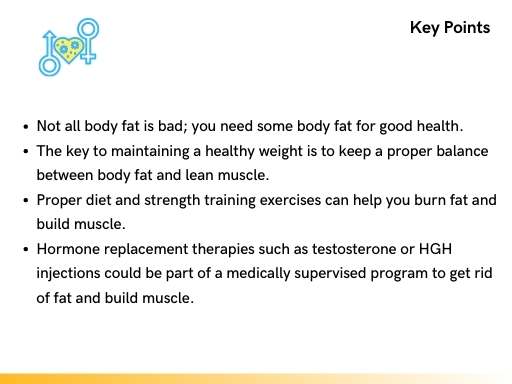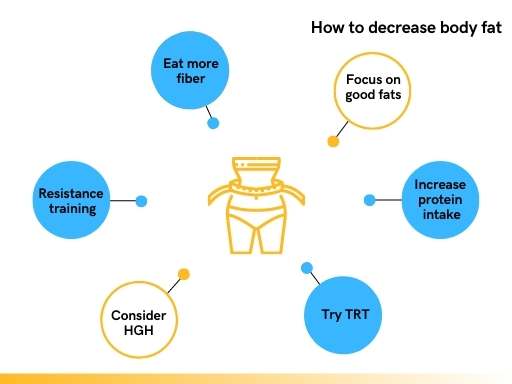 Not all body fat is bad, the key to good health is maintaining a proper percentage of body fat to your percentage of lean muscle, that ratio is usually measured as your body mass index, or BMI.
Not all body fat is bad, the key to good health is maintaining a proper percentage of body fat to your percentage of lean muscle, that ratio is usually measured as your body mass index, or BMI.
In most people, BMI correlates to body fat — the higher the number, the more body fat you may have. High body fat brings with it an increased risk of several health problems. Excess body fat often leads to heart disease, stroke, and Type 2 diabetes. But low body fat can cause health issues as well.
Low body fat can lead to malnutrition and hormonal disorders. You need the “right” percentage of body fat to help you absorb vitamins and nutrients. Fat also provides energy for your cells, helps you regulate body temperature, and provides a layer of protection for your vital organs.
The key to good health, therefore, is maintaining the right amount of fat along with the right amount of lean muscle. There are several healthy ways to burn fat and build muscle. Reducing your caloric intake and exercise are, of course, crucial to reducing fat and building muscle, but sometimes it may take more than that.
Older men and women who may be having trouble getting rid of stubborn body fat and building muscle – even when dieting and exercising – may need the added boost of hormone replacement therapy.
What Makes Your Body Store Fat?
Your body is designed to store fat. The calories in the foods you eat are converted into energy for your cells, particularly to power your muscles. Your muscles use energy even when they are not moving. But your muscles, your liver, and your bloodstream can only use and store so much of the glucose, the fuel for your body from the calories you ingest. It needs another place to store the reserves, and that is one of the main reasons why your body stores fat – so there is another safe place to keep unused sugars.
Simply put, when you take in more calories than your muscles can burn, they get stored as fat, theoretically for later use. However, if you continually take in more calories than you burn, more and more gets stored as fat, and high body fat, obesity, and its complications are often the result.
Does Body Fat Serve a Useful Purpose?
You may think fat is ugly and unhealthy, but all body fat is bad. In fact, our bodies need a certain percentage of stored fat for a variety of reasons. It is only when you have body fat in excessive amounts that it can create health issues.
Fat exists in every cell in your body, and it is there for a reason. Fat supplies energy for the body just like protein and carbohydrates. Stored fat could be essential in times of famine.
Fat also plays a role in regulating hormones, body temperature, immune function, reproduction, and maintaining insulin and blood sugar levels. Your brain is over 60% fat. Essential “fat-soluble” vitamins such as A, D, E, and K all need body fat to be absorbed and used by your body.
Healthy Body Fat Percentage for Men and Women
Optimal BMI and the exact percentages of body fat for men and women remains a hotly debated topic. However, generally speaking, body fat guidelines suggest that men should have at least 2% to 5% body fat for minimal health, 2% to 24% body fat is considered healthy, and anything over 25% body fat falls in the obese range.
Women naturally have more adipose tissue and body fat than men to be prepared for pregnancy. For women, 10% to 13% body fat is minimally essential, 10% to 31% body fat is considered healthy, and more than 32% body fat classifies as obese.
But as you can see, with such large ranges, the healthiest percentage of body fat for any given man or woman can vary greatly from individual to individual.
Why is Reducing Body Fat Important?
Keeping your body fat percentage out of the overweight or obese percentages is very important to your overall health. People with a high level of body fat, with BMIs in the overweight or obese range, are at greater risk for several negative health issues. High body fat can lead to heart attacks, stroke, diabetes, high blood pressure, arthritis, and other joint issues, even some forms of cancer. Being obese significantly decreases your lifespan overall.
Is There Anyone Who Shouldn’t Reduce Body Fat?
Not all body fat is bad. A proper amount of body fat that is in proportion to your muscle is necessary for good health and many bodily functions. While carrying too much body fat and obesity is linked to a number of health risks, including diabetes, heart disease, and cancer, having too little body fat can also be dangerous.
This is why rapid or extreme weight loss is never a good idea.
In addition, there are certain people who should not reduce their body fat percentage. Women who are pregnant or breastfeeding should not reduce their body fat. Anyone who is immunocompromised or suffering from a muscle-wasting condition such as HIV/AIDS should not lose body fat. Also, seniors should not endeavor to lose large proportions of body fat without a doctor’s supervision.
Best Ways to Decrease Body Fat and Build Lean Muscle
 Add resistance training to your routine – Strength training, resistance training, and specifically high-intensity interval training have been shown to be the best exercises to burn fat and build muscle. Also, these kinds of strength training exercises naturally increase your HGH production. Increasing HGH will further improve your ability to burn fat and build muscle.
Add resistance training to your routine – Strength training, resistance training, and specifically high-intensity interval training have been shown to be the best exercises to burn fat and build muscle. Also, these kinds of strength training exercises naturally increase your HGH production. Increasing HGH will further improve your ability to burn fat and build muscle.- Eat more fiber – Fiber is not only good for digestion, but it also helps you feel fuller, so you eat less. Fiber also helps you maintain a healthy gut microbiome and can lower your risk of diabetes and certain cancers.
- Focus on good fats – When it comes to fat in your diet, there are “good fats” and “bad fats.” You want to eat more of the good and reduce or eliminate the bad. Any food label with “trans fats” are the kind to be avoided. Foods with good fats include avocados, olives and olive oil, eggs, nuts, and legumes.
- Increase protein intake – If you want to burn fat and build muscle, cut back on junk and processed foods and increase your intake of lean proteins.
- Watch what you drink – Reduce your consumption of soda pop, other sugary beverages, and alcohol.
- Try testosterone replacement therapy – Testosterone replacement therapy can boost your metabolism and help you to burn fat and build lean muscle.
- Consider HGH injections – Like testosterone therapy, human growth hormone or HGH injections can also increase metabolism, increase your energy and exercise capacity and help you burn fat and build muscle.
Conclusion
Maintaining a proper balance between body fat and lean muscle is critical to good health. But, as you grow older – particularly in men – age-related hormone loss can make it harder to burn fat and build muscle.
Testosterone replacement therapy and/or growth hormone therapy have been clinically proven to raise your metabolism and improve your ability to burn fat and build muscle.
Testosterone injections and HGH injections are often used as part of a doctor-supervised medical weight loss program. HRT is effective for weight loss because of its impact on fat metabolism and the ability to build lean muscle. Both of these hormones play a vital role in your body’s ability to burn fat and build lean muscle.
HGH and testosterone therapy together or alone can help you to shed unwanted pounds, particularly around the middle. If you are between the ages of 40 and 65 and are having trouble getting rid of unwanted body fat, even while dieting and exercising, age-related hormone decline is likely to blame.
But the only way to know if you are suffering from low testosterone or age-related growth hormone deficiency is to see a doctor and have your hormone levels tested.
Our hormone replacement specialists have been helping men and women just like you get back into the best shape of their lives with hormone replacement therapy.


 Add resistance training to your routine – Strength training, resistance training, and specifically high-intensity interval training have been shown to be the best exercises to burn fat and build muscle. Also, these kinds of strength training exercises naturally increase your HGH production. Increasing HGH will further improve your ability to burn fat and build muscle.
Add resistance training to your routine – Strength training, resistance training, and specifically high-intensity interval training have been shown to be the best exercises to burn fat and build muscle. Also, these kinds of strength training exercises naturally increase your HGH production. Increasing HGH will further improve your ability to burn fat and build muscle.